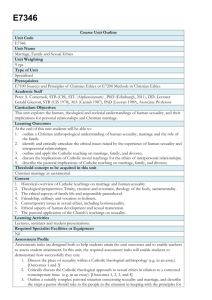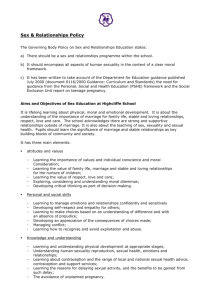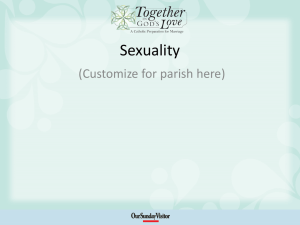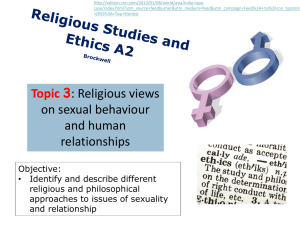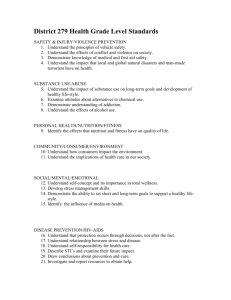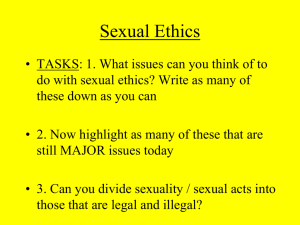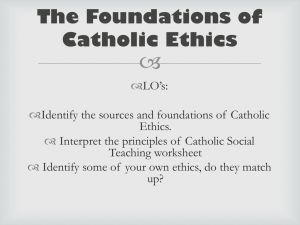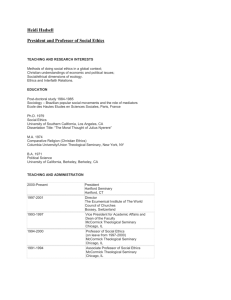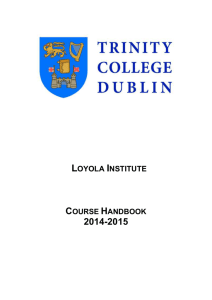E9647
advertisement
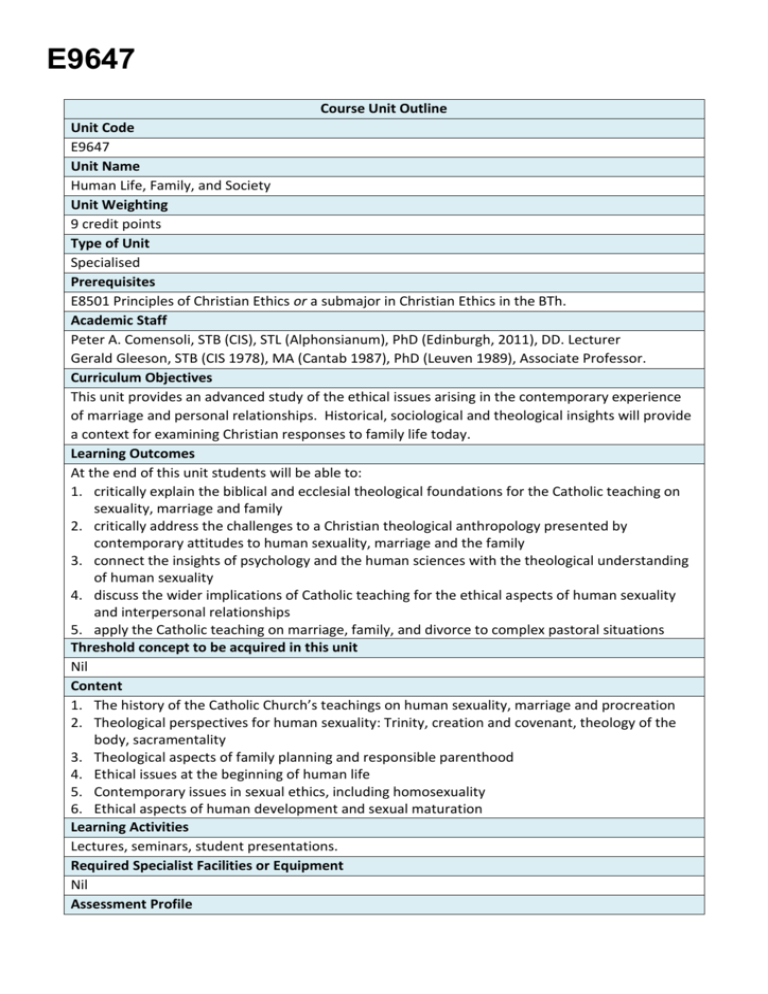
E9647 Course Unit Outline Unit Code E9647 Unit Name Human Life, Family, and Society Unit Weighting 9 credit points Type of Unit Specialised Prerequisites E8501 Principles of Christian Ethics or a submajor in Christian Ethics in the BTh. Academic Staff Peter A. Comensoli, STB (CIS), STL (Alphonsianum), PhD (Edinburgh, 2011), DD. Lecturer Gerald Gleeson, STB (CIS 1978), MA (Cantab 1987), PhD (Leuven 1989), Associate Professor. Curriculum Objectives This unit provides an advanced study of the ethical issues arising in the contemporary experience of marriage and personal relationships. Historical, sociological and theological insights will provide a context for examining Christian responses to family life today. Learning Outcomes At the end of this unit students will be able to: 1. critically explain the biblical and ecclesial theological foundations for the Catholic teaching on sexuality, marriage and family 2. critically address the challenges to a Christian theological anthropology presented by contemporary attitudes to human sexuality, marriage and the family 3. connect the insights of psychology and the human sciences with the theological understanding of human sexuality 4. discuss the wider implications of Catholic teaching for the ethical aspects of human sexuality and interpersonal relationships 5. apply the Catholic teaching on marriage, family, and divorce to complex pastoral situations Threshold concept to be acquired in this unit Nil Content 1. The history of the Catholic Church’s teachings on human sexuality, marriage and procreation 2. Theological perspectives for human sexuality: Trinity, creation and covenant, theology of the body, sacramentality 3. Theological aspects of family planning and responsible parenthood 4. Ethical issues at the beginning of human life 5. Contemporary issues in sexual ethics, including homosexuality 6. Ethical aspects of human development and sexual maturation Learning Activities Lectures, seminars, student presentations. Required Specialist Facilities or Equipment Nil Assessment Profile Assessment tasks are designed both to help students attain the unit outcomes and to enable teachers to assess student attainment. In this unit, the required assessment tasks will enable students to demonstrate how successfully they can: 1. Critically explain the way a Catholic theological anthropology understands human sexuality (e.g. in an essay). [Outcomes 1 and 2] 2. Discuss and respond to the challenges to Catholic sexual ethics raised in contemporary western culture. (e.g. in an essay). [Outcomes 2, 3 and 4] 3. Present a theological and pastoral analysis of a pastoral situation arising for people striving to live out the Church’s teaching (e.g. in a essay or oral presentation). [Outcomes 2, 3 and 5] Representative References 1. Cloutier, David (ed). Leaving and Coming Home. New Wineskins for Catholic Sexual Ethics. Eugene, OR: Cascade Books, 2010. 2. Cloutier, David. Love, Reason and God’s Story: An Introduction to Catholic Sexual Ethics. Winona, MN: Anselm Academic, 2008. 3. Collins, R.F. Sexual Ethics and the New Testament. Behavior and Belief. New York: Crossroad, 2000. 4. Farley, M.A. Just Love. A Framework for Christian Sexual Ethics. New York: Continuum, 2006 5. Garcia de Haro, R. Marriage and the Family in the Documents of the Magisterium. A Course in the Theology of Marriage. San Francisco: Ignatius Press, 1993. 6. Genovesi, V.J. In Pursuit of Love. Catholic Morality and Human Sexuality. 2nd ed. Collegeville: Liturgical, 1996. 7. Grabowski, John. Sex and Virtue. An Introduction to Sexual Ethics. Washington, Discipline Coordinators: CUA Press, 2003. 8. Grisez, Germain. The Way of the Lord Jesus. 1: Christian Moral Principles. Quincy, Ill: Franciscan Press, 1993. 9. Kaczor, Christopher. Proportionalism and the Natural Law Tradition. Washington, Discipline Coordinators: CUA Press, 2002. 10. Keenan, James F. A History of Catholic Moral Theology in the Twentieth Century. New York: Continuum, 2010. 11. Lawler, M. Marriage and the Catholic Church. Disputed Questions. Collegeville: Liturgical Press, 2002. 12. May, W.E., R. J. Lawler & J. R. Boyle. Catholic Sexual Ethics. 3rd ed. Huntington: Our Sunday Visitor, 2011. 13. May, William E. Theology of the Body in Context. Genesis and Growth. Boston, MA: Pauline Book and Media, 2010. 14. McDonagh, Enda & Vincent MacNamara. An Irish Reader in Moral Theology. Vol. 2: Sex, Marriage and the Family. Dublin: Columba Press, 2011. 15. Roberts, Christopher C. Creation and Covenant. The Significance of Sexual Difference in the Moral Theology of Marriage. New York: T&T Clark, 2007. 16. Salzman, T.A., T.M. Kelly & J.J. O’Keefe (eds). Marriage in the Catholic Tradition: Scripture, Tradition and Experience. New York: Crossroad, 2004. 17. Shivanandan, M. Crossing the Threshold of Love. A New Vision of Marriage in Light of John Paul II’s Anthropology. Edinburgh: T & T Clark, 1999. 18. Smith, J. E. Humanae Vitae. A Generation Later. Washington: CUA, 1991. 19. Wojtyla, K. Love and Responsibility. Translated by H. T. Willetts. London: Collins, 1981
